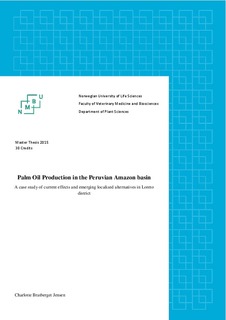Palm oil production in Peruvian Amazon Basin. A case study of current effects and emerging localized alternatives in Loreto district
Master thesis
Permanent lenke
http://hdl.handle.net/11250/295000Utgivelsesdato
2015-08-06Metadata
Vis full innførselSamlinger
- Master's theses (IPV) [240]
Sammendrag
An analysis of palm oil production in the Peruvian Amazon basin was carried out in a systemic way, as part of a whole, with its complexities. With an agroecological perspective, the social, ecological and economic effects of this production are discussed. Additionally, alternatives that could better fulfil the necessities of farmers were explored.
The oil palm, Elaeis guineensis, originally from West Africa, is a common plant in an enormous industry that is extensive in South East Asia, mainly in Indonesia and Malaysia. The monoculture production has become massive in several parts of the world and is expanding rapidly in Latin America, along with the global demand. The Peruvian State and foreign agencies, such as the UN and USAID, promote oil palm production as a means to replace illegal drug activity in Peru, and articulates that it is a development project. A case study was conducted with participant observation and in-depth open-ended interviews, which were performed in five locations in the Peruvian Amazon. A total of 26 people related to palm oil production were interviewed.
Some of the negative effects explored characterize palm oil production as socially problematic and ecologically disastrous; yet, it is often economically beneficial in the short run. Although palm oil production increased income for some households, the long-term consequences included instances where land of fertile soil was cheaply sold or encroached from local people. Furthermore, interviewees reported problems such as the disappearance of people, hidden cocaine production, corrupt decision-making and loss of safety in villages where palm oil workers arrive from other parts of the country. Ecological consequences of palm oil are also discussed. Among these the deforestation of enormous areas of primary forest are frequent. Consequently, other ecological problems appear as a result of these deforested areas, such as soil erosion, species migration, and fewer habitats and ecological services for people’s livelihoods.
In contrast, experiences with local sustainable alternatives to palm oil were examined. These alternatives may compete against palm oil from an economic perspective, and exceed it in ecologic and social perspectives. Examples are found in cocoa and timber agroforestry. An essential need to foster alternative production is land entitlement. This condition would allow farmers to feel ownership and find it worthwhile to consider a longer time perspective in their projects. Even though former practices have worked well without a title of ownership, today private property and commercialisation of land make the situation a lot more vulnerable without proofs of ownership.
